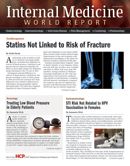For Older Diabetics, Tight Glycemic Control Comes with Risks
Research recently published in JAMA suggested physicians working to control older diabetics' glycemic levels were actually over treating them.

Research recently published in JAMA suggested physicians working to control older diabetics’ glycemic levels were actually over treating them.
For their study, Kasia J. Lipska, MD, MHS and her colleagues assessed National Health and Nutrition Examination Survey (NHANES) data and included 1,288 diabetic patients who were 65 or older and had available hemoglobin A1c (HbA1c) measurements.
To find out whether comprehensive glycemic control treatments were linked to diabetics’ quality of life, their overall health status was classified to 1 of 3 categories: complex/poor, complex/intermediate, or relatively healthy. A complex/poor rating was designated if the person had difficulty completing 2 or more daily activities or were on dialysis; complex/intermediate if they had trouble completing 2 tasks and were comorbid for 3 or more chronic conditions; and relatively healthy if none of these standards applied.
From a nationally representative sample, the investigators found 61.5% of patients (95% CI, 57.5%-65.3%), or 3.8 million Americans (95% CI, 3.4-4.2), with HbA1c levels less than 7% — indicating the patient underwent tight glycemic control — were considered relatively healthy, 63.0% (95% CI, 57.0%-68.6%) had complex/intermediate health, and 56.4% (95% CI, 49.7%-62.9%) were of very complex/poor health (P = .26).
Among patients with HbA1c levels less than 7% and were using insulin or sulfonylureas, the authors reported 54.9% (95% CI, 50.4%-59.3%) were relatively healthy, 58.7% (95% CI, 49.4%-67.5%) had complex/intermediate health, and 60.0% (95% CI, 51.4%-68.1%) had very complex/poor health (P= .14).
Concluding their study, the authors determined older diabetic patients weren’t likely to benefit from intensive glycemic treatment which, and are at risk for developing conditions like severe hypoglycemia based on insulin and sulfonylurea use.
“Recognition of both the harms and benefits of glycemic control is critical for patients and physicians and other health care professionals to make informed decisions about glucose-lowering treatment,” the writers urged.
